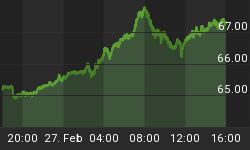On Tuesday of this week we learned that in 2006 Americans racked up a record $763.6 Billion trade deficit, and that two Australian mining firms, Rio Tinto and BHP Billiton, were each contemplating $40 billion bids for U.S. aluminum giant Alcoa. Not only did Wall Street and the media fail to grasp the negative significance of each story, but they also failed to see the strong connection between the two.
By running huge trade deficits, Americans are literally selling cows to buy milk. Alcoa is just the latest heifer headed for the auction block. In other words, because we do not trade enough domestically manufactured consumer goods for those we import, we are making up the difference with our assets instead. To the extent that foreigners are tiring of buying more Treasuries and mortgage-backed securities, they are casting their eyes on industrial assets. Last year's trade deficit alone provided foreigners with enough dollars to buy twenty Alcoa's.
Many Americas do not see the downside of such a transfer. In fact, they might even see it as a benefit, as shares of Alcoa would likely rise sharply. However, in exchange for losing one of the world's preeminent mining companies to Australia, Americans would only be compensated by the return of their paper dollars. Future profits that would have been earned by Americans will now be earned by Australians instead.
Founded in Pittsburg in 1886, Alcoa is now the world's leading producer and manager of aluminum, employing more than 120,000 employees in 44 countries. Every day Alcoa mines 86,300 tons of bauxite and 27,300 tons of coal, refines 41,000 tons of alumina, smelts 9,575 tons of aluminum, recycles 2,300 tons of aluminum, manufactures 8,810 tons of aluminum products, produces 166 million closures for beverage and food containers, assembles wire harnesses for 20,400 vehicles, generates 96,000 MWH of electricity, and purchases $27 million in goods and services. The sale of Alcoa would be a great loss to the American industrial landscape.
It is astounding that so many fail to see the sale as further proof of America's economic decline. In his testimony yesterday before the Senate Banking Committee, Fed Chairman Ben Bernanke showed little concern for the trade deficit and its implications for the American economy. If our economy really was as strong as Mr. Bernanke believes, Alcoa would be buying foreign companies, not the reverse. Nations with strong economies use their trade surpluses to acquire choice foreign assets. Nations with weak economies are forced by their trade deficits to surrender those assets.
In the end, when foreign central banks finally allow the dollar to collapse, it's not just Alcoa, but many other Dow Jones companies that will ultimately fall into foreign hands. After all, a sharp decline in the dollar will make those companies dirt cheap for foreign buyers, who will have little else to buy with the trillions of dollars burning holes in their very deep pockets. America will be reduced to the role of a secondary economic power. Our citizens will work primarily for foreign-owned companies while the profits are sent back to their far wealthier foreign bosses.
For a more in depth analysis of the precarious state of the American economy and its dependence on foreign lenders and producers, order a copy of my new book "Crash Proof: How to Profit from the Coming Economic Collapse" by clicking here.
In addition make sure to protect your wealth and preserve your purchasing power before it's too late. Discover the best way to buy gold at www.goldyoucanfold.com, download my free research report on the powerful case for investing in foreign equities available at www.researchreportone.com, and subscribe to my free, on-line investment newsletter at http://www.europac.net/newsletter/newsletter.asp.















